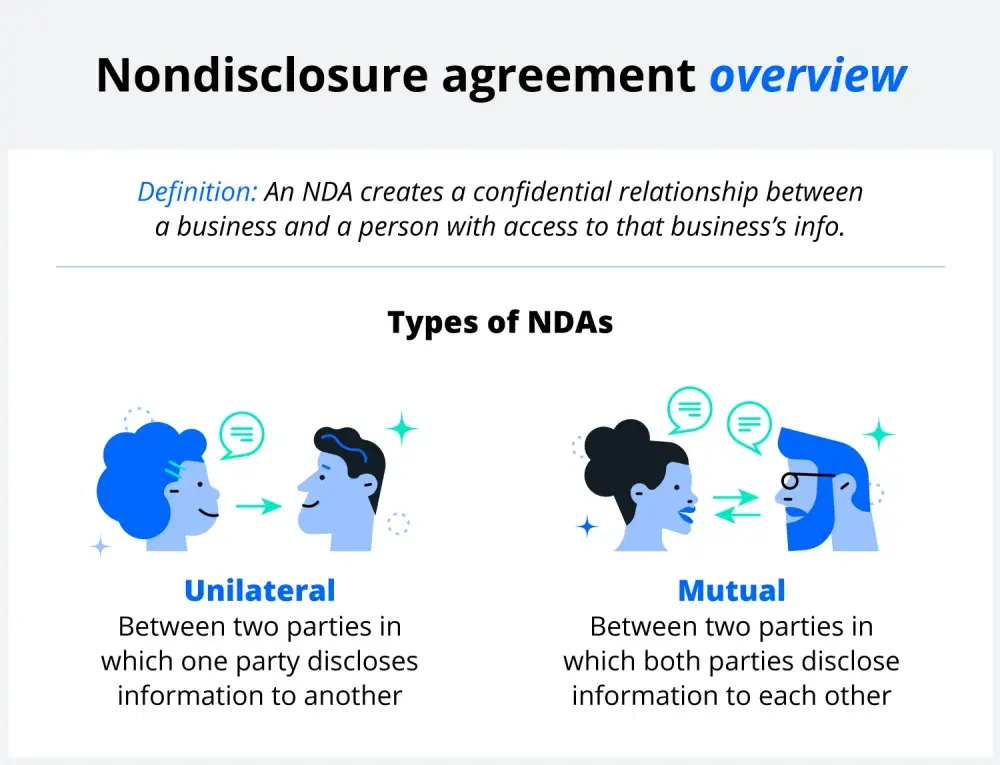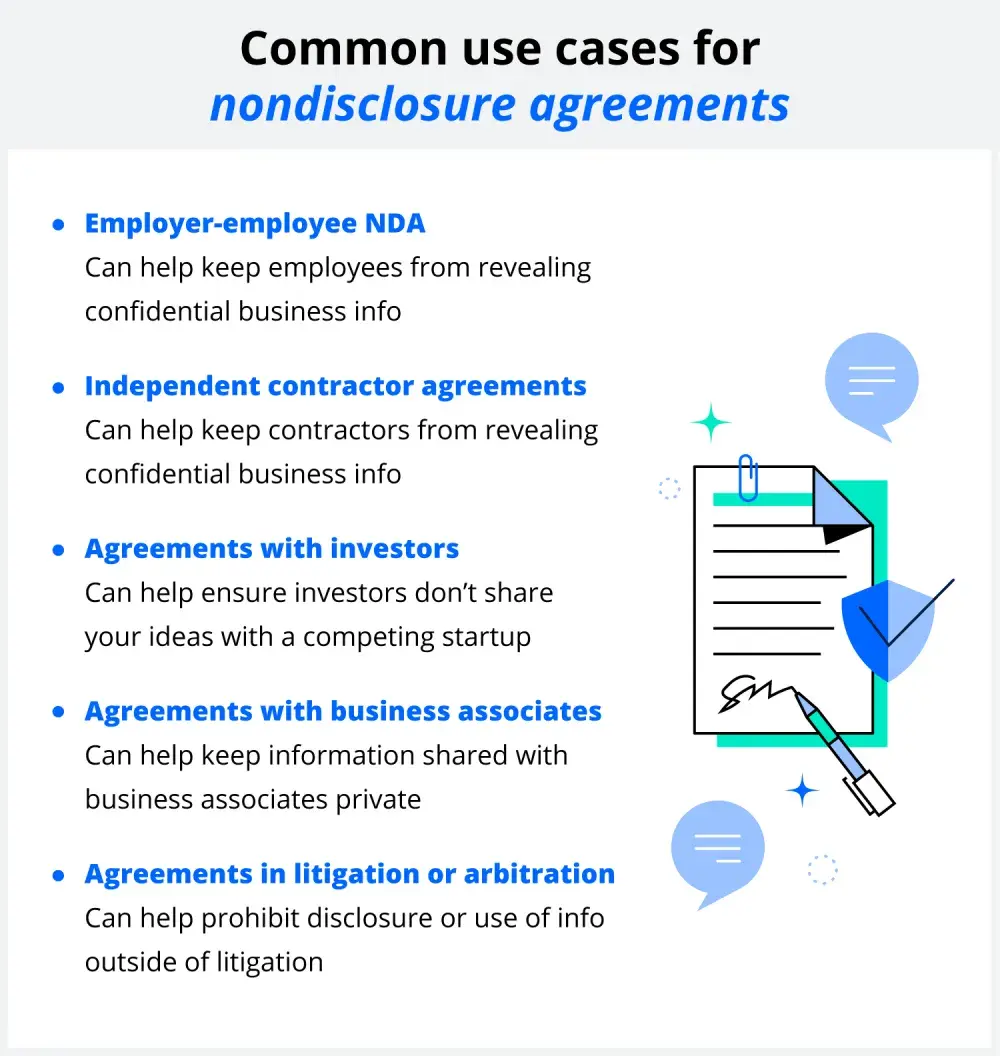
Businesses rely on NDAs to preserve confidentiality and maintain their competitive edge. Here’s what you should know about these legal agreements.
Get your nondisclosure agreement


by Miles Almadrones
Miles is a legal writer and content marketing specialist with a background in operations management and logistics. He.

Legally reviewed by Allison DeSantis, J.D.
Allison is the Director of Product Counsel at LegalZoom, advising and providing leadership to internal teams on the d.
Updated on: August 9, 2024 · 9 min read
Nondisclosure agreements, or NDAs, protect confidential business information from being prematurely disclosed to the public or falling into the hands of competitors. Whether used in employment contracts, business negotiations, or product development, NDAs establish clear boundaries for handling sensitive information and potential legal consequences for breaches.
 She shakes hands with a man across the desk." width="1000" height="556" />
She shakes hands with a man across the desk." width="1000" height="556" />
Also known as a confidential disclosure agreement, an NDA creates a confidential relationship between a person or business that has confidential or trade secret information and another person who has access to that information. The NDA protects these business secrets by defining confidential information and limiting the way it can be used or disclosed.

A trade secret is any type of confidential and proprietary information that a business wants to keep private so it can enjoy an economic advantage over its competitors. The term “trade secret" may sound high-tech—and in fact, technology companies often deal in trade secrets—but trade secrets aren't relegated to any one industry.
Trade secrets can take many forms:
An NDA may be a stand-alone legal agreement or may exist in confidentiality clauses in another document, such as an employment agreement, an independent contractor agreement, or another contract that establishes a business relationship.
A standard NDA or confidentiality agreement includes the following:
It depends on the terms of the NDA. Breaching or violating an NDA is a serious offense and can result in one of several courses of action.
Here are some actions that can come from NDA violations:
There are a couple types of nondisclosure agreements to consider, depending on the situation. Some are one-sided, while others contain restrictions on both sides.
Unilateral nondisclosure agreements are the most common NDAs available. They act as a one-way contract, as only one party discloses information to another party. Some common examples of unilateral NDAs include:
Mutual nondisclosure agreements (MNDA), also known as bilateral agreements, are used when two parties disclose confidential information to each other. Each party can then decide how their information is restricted and used.
For example, a company contemplating a merger or joint venture with another company may enter into a mutual nondisclosure agreement. This way, they're both able to share private company information without fear of it being used against them.
Nondisclosure agreements have become increasingly common in various situations. Here are a few examples:
If your business deals with sensitive information, inventions, research, or product development, you'll want to make sure your employees don't divulge company information to outsiders. Even if you just have ordinary business information such as sales data and customer lists, an employee nondisclosure agreement can help keep that information out of the hands of competitors.
Whether it's your virtual assistant, your part-time bookkeeper, or the person you hired to help with a special project, independent contractors may have access to information that you don't want to be made public. Like an employee NDA, an independent contractor NDA can help keep business information private.
If you approach venture capitalists or other investors for funding, you'll likely need to divulge information about your products, your finances, and your business plans. An NDA can help ensure that they don't share your ideas with a competing business.
Lawyers are obligated to keep their clients' information confidential, but that's not true of most other businesspeople. If the people with whom you do business receive or have access to your confidential business information, you may want them to sign an NDA.
When two parties are in a dispute, there is a formal process for exchanging information. Both parties must sign confidentiality agreements that prohibit disclosure or use of the information outside of the litigation. This prevents competition and theft.

An NDA is crucial for protecting sensitive information, regardless of the industry or business purpose. Still, it’s essential to be aware of the implications, both positive and negative, before creating or agreeing to an NDA:
Like other legal documents, you should carefully read and understand the terms before you sign a nondisclosure agreement. Better yet, you can ask your attorney to draft or review your NDA, freelancer agreements, or any other confidential disclosure agreements to confirm they work in your best interests.
Nondisclosure agreements may act as a safety net for your business information, but they're not a catchall. NDAs possess certain limitations when it comes to protecting your ideas. These limitations include:
Keep reading for answers to some exploratory questions regarding NDAs.
Yes, many NDAs have expiration dates. The duration typically ranges from one to five years, though some may last indefinitely. The expiration date (if any) should be clearly stated in the agreement, after which the protected information may no longer be considered confidential.
Within nondisclosure or proprietary information agreements, there is an exclusions clause containing information that is omitted from the agreement. On the other hand, if an agreement is too vague or tries to include nonconfidential information, it can be legally challenged.
Nondisclosure agreements are legally binding contracts and are therefore legally enforceable.
During the course of your business or employment, it's likely that you will be asked to sign a nondisclosure agreement. Remember that nondisclosure agreements can be contained in other documents, so you should look for headings such as "Confidentiality," "Confidential Information," or "Nondisclosure."
Also pay attention to the amount of time the NDA will remain in effect for, as some NDAs can remain in effect past the term of employment. Look for the information that is deemed confidential to ensure it's not too vague or overreaching.
Finally, make sure what's considered a breach of contract is included in the NDA.
The cost of an NDA can vary significantly. Simple, template-based NDAs may be free or cost under $100. Depending on complexity, custom NDAs drafted by lawyers often range from $200 to $1,000 or more. Ongoing legal support for NDAs (such as enforcement or modifications) can also incur additional costs over time.
A noncompete and NDA agreement are different types of contracts that protect a company’s interests, but they can sometimes overlap. An NDA primarily protects confidential information, whereas a noncompete restricts future employment. However, the FTC recently announced a ban on noncompete clauses, so it’s crucial to consult a lawyer regarding these agreements.
While NDAs might seem straightforward, especially with dozens of templates online, the specifics of contract law and the potential long-term implications of these agreements make it advisable to seek legal guidance. An employment attorney is best equipped to handle your NDA, as they can:
NDAs are crucial for protecting your business interests, but their effectiveness hinges on proper drafting and implementation. If you have any questions or doubts about the process, it might be wise to find an attorney to ensure your NDA provides the protection your business deserves.
Find more Legal Forms and TemplatesThis article is for informational purposes. This content is not legal advice, it is the expression of the author and has not been evaluated by LegalZoom for accuracy or changes in the law.
You may also like
Use these tips to negotiate an NDA that will keep your information as secure as possible.
April 17, 2024 · 3min read
March 13, 2024 · 12min read
February 14, 2024 · 6min read